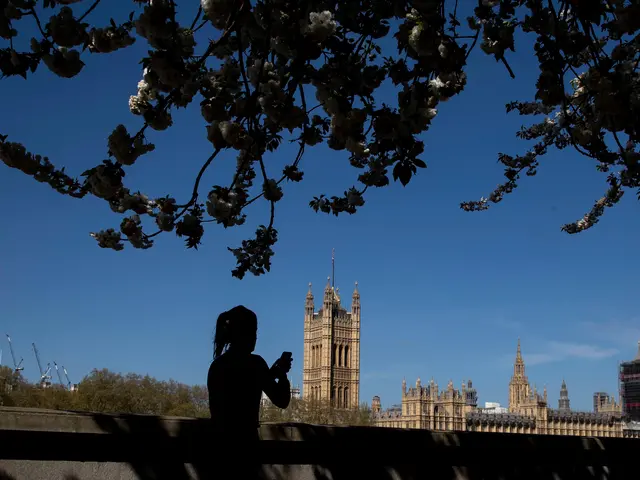Lawmakers returned to Britain's Houses of Parliament Tuesday for their first day back after an extended holiday enforced by COVID-19.
Unlike the usual hustle and bustle atmosphere resembling the start of a new term at college, only a trickle of MPs entered the famous wood-paneled chamber, one of the most watched debating venues in the world.
Britain remains in lockdown, with millions of workers forced to stay at home. Opposition politicians, though, were eager to see the wheels of parliament turning again to enable them, as Labour's Valerie Vaz said, to hold Prime Minister Boris Johnson's government to account.
As though to emphasize her point, Vaz, the shadow leader of the Commons, gave notice that when the real debates start again Wednesday, there would be questions directed at the government about its response to the coronavirus crisis.
Tuesday, the first day back, was not the time for the usual political scraps between rivals.
Speaker Lindsay Hoyle said that to follow the 2-meter distancing policy, only 50 of the 650 MPs would be allowed to enter the chamber at any one time.
Dozens more will be in their constituencies in every corner of Britain, participating in debates and proceedings through a video conferencing system known as Zoom.
The hybrid format needed parliamentary approval before it was introduced.
After a debate lasting over two hours, Speaker Hoyle sought the views of the MPs present, representing a splattering of politicians from the Conservative and opposition benches.
All those in favor replied with a familiar "aye", while those against said No. There was a silence, as Hoyle proclaimed "The ayes have it, the ayes have it."
The decision gave the green light to the biggest ever change in the parliamentary procedure in its 700-year history.
Politicians from all sides agreed it was not a perfect answer compared to the often packed and noisy debating chamber, but it was better than nothing.
Parliamentary staff carried out a dress rehearsal Monday ahead of the re-opening Tuesday.
Meanwhile a report by the Commons Procedure Committee warned of the risks of relying on new and untested technology for debates and votes. But the cross-party committee gave its support for the hybrid sittings.
The first full proceedings using the Hybrid Parliament system will take place Wednesday.
One of the first big tests for the new system will come Wednesday when the weekly Prime Minister's Questions session takes place.
Prime Minister Johnson, still recovering from COVID-19, will not be taking part. Instead, Foreign Secretary Dominic Raab will be in the dispatch box to answer questions.
Johnson, showing signs of an eagerness to return to the front line of politics after his experience with the coronavirus, had a brief conversation with U.S. President Donald Trump. Another conversation is planned with British Queen Elizabeth II.
Downing Street said Johnson and Trump, in their phone call, had agreed on the importance of a coordinated response to the virus, including through the G7 group of nations.
The Times in London reported that Johnson had not formally returned to work and that Raab, who is continuing to deputize, will chair cabinet on Thursday.
The Times quoted sources saying it was possible that the prime minister would return to Downing Street full time next week but no date had been set.
Though the usual rowdy PM atmosphere will be more subdued on Wednesday, Raab, standing in as First Secretary, is expected to face some tough questions from MPs in the House, as well as MPs joining in via the videolink from the homes.
Welcoming MPs back to Westminster after an extended Easter period recess, Speaker Hoyle described the situation as exceptional and unprecedented.
Leader of the House of Commons Jacob Rees-Mogg said business over the coming weeks will be limited to oral questions, statements and urgent questions.
He said the government is looking into extending virtual ways of working and more substantive business, including legislation.
Karen Bradley, chair of the House of Commons Procedure Committee said doubts had been raised about an electronic voting system planned for use during the period of the "hybrid" parliament.
Usually politicians head through "yes" and "no" lobbies at the side of the House of Commons when they vote.
Rees-Mogg told MPs no contentious legislation was planned for the first few weeks to enable the system to be properly tried and tested.
Special lanes have been marked out on the floor of the chamber to ensure politicians and staff follow the distancing rules.
Video screens have also been placed around the chamber which allow 120 MPs to take part in debates from their homes.
Initially, the special arrangements will continue until mid-May unless politicians agree to an extension.
(ASIA PACIFIC DAILY)
 简体中文
简体中文





